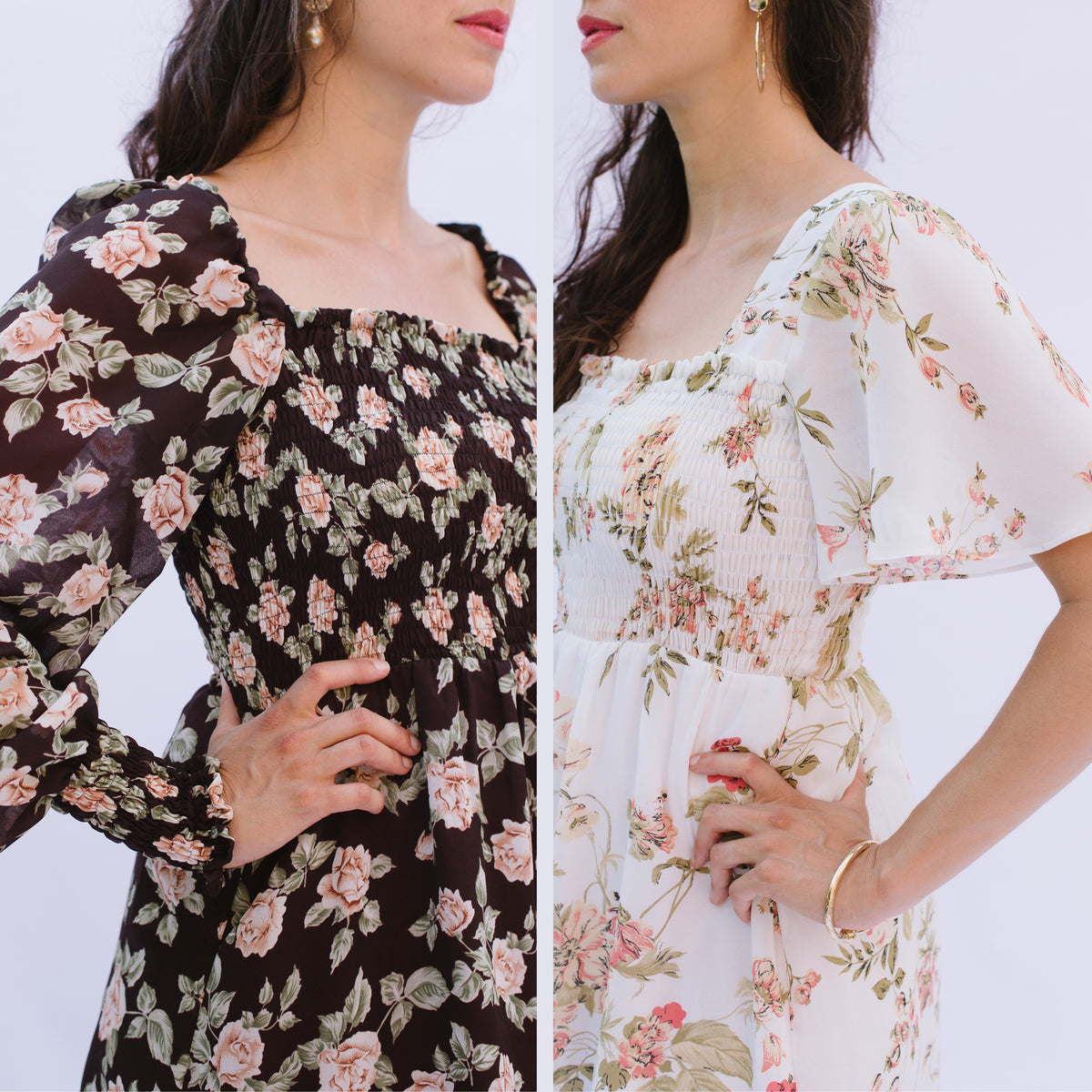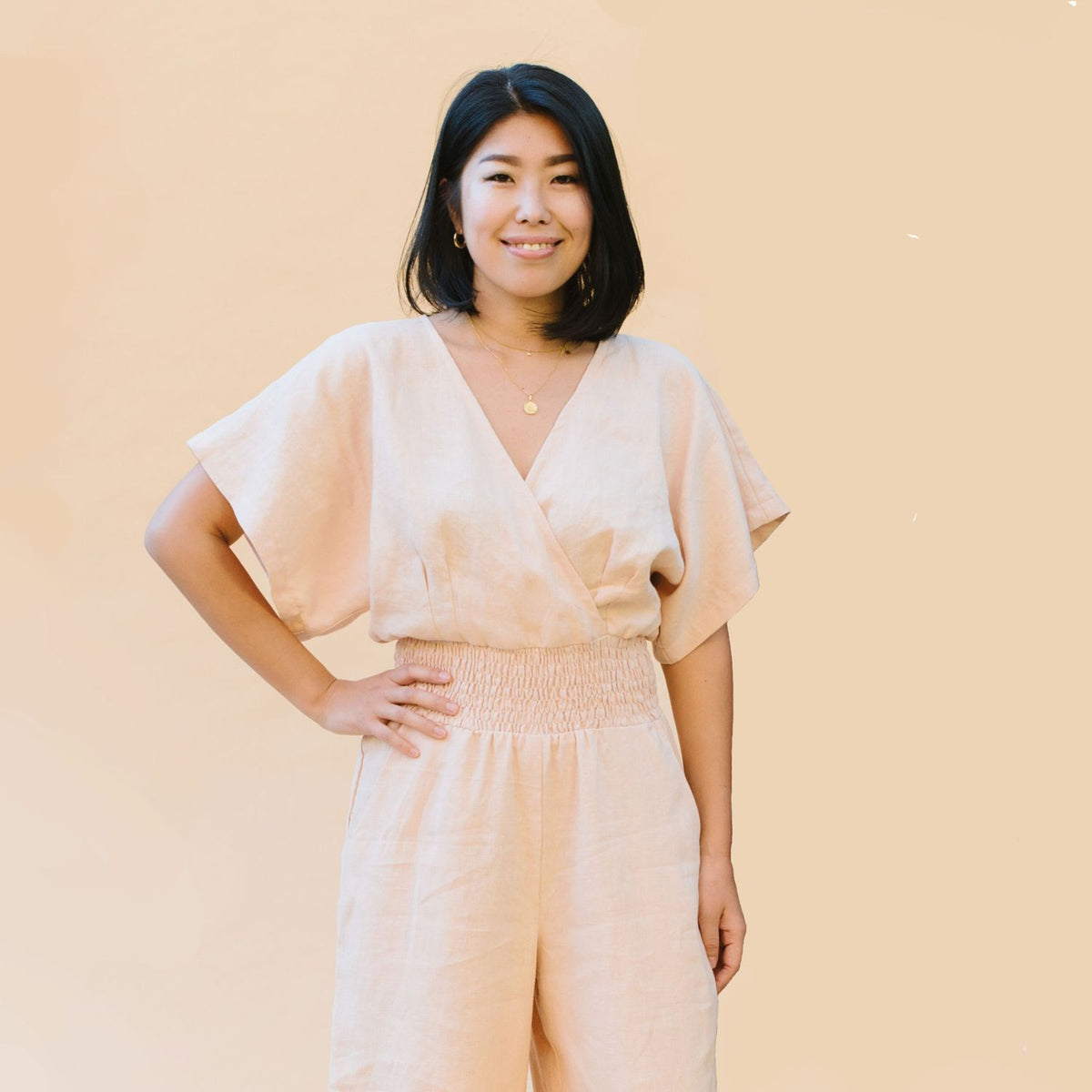JACKIE SEWALONG CONSTRUCTION DAY THREE

In Today's sewalong, we will cover sewing the shoulders and finishing the facing and neckline of the Jackie dress. There are lots of tips to learn in this tutorial as we teach you how to sew stabilizing elastic into a knit seam, tail tuck serger thread, offset seam allowance to reduce bulk, use your machines pushing and pulling action with your feed dog and pressure foot to your advantage, understitch with knit, and finally, how to secure a facing in place.
SHOULDERS:
The shoulder seams carry the weight of the dress and will need to be stabilized to give strength to the seams. For this you can use 1/4" (6 mm) clear elastic.
If this is the first time you're sewing in clear elastic into a seam, I'd suggest practicing with scrap fabric before sewing the shoulder seam.
- Pin the front and back dress right sides together at the shoulders. With a baste stitch, sew the shoulder seams together. Since this is knit, use a zig-zig baste.
Setting: regular zig-zag stitch.
Length: 5 mm
Width: 4 mm
- Cut two pieces of elastic for the shoulders. The elastic length should be longer than the shoulder. When sewing, allow the elastic to extend past the shoulder at either end. This will make handling the elastic easier.
- As you begin to sew, place the elastic on top of the shoulder seam and align it to the shoulder edge. Hold the elastic taut, but do not pull enough to stretch out the elastic. Complete the seam.
If you've made a mistake and need to rip out the stitch and start again, use a new piece of elastic.



FACING:
Place the Front Facing (H) right sides together with the Back Facing (D). Match the side edges, pin and sew together.


If you used a serger for the seam:
Trim the excess thread along the upper neckline edge.
The remaining tail of thread along the lower facing edge can be pulled through the serge stitch channel. This is known as a tail tuck and is done in place of a backstitch. I have opted to do the tail tuck on this portion of the seam since the lower facing edge has no other finishing that would secure the seam.
Thread a hand sewing needle with the remaining tail of thread.




Turn the dress right side out. Align the facing neckline along the neckline of the dress. Make sure that the shoulder seams of the dress and facing are offset as you pin the edges together. This will help to eliminate bulk along the neckline seam.
Reminder: The dress shoulder seam allowance is turned towards the dress back. Facing seam allowance is turned towards the Front Facing.

When sewing the facing/dress neckline seam, sew with the facing right side up.
The reason for this is because when serging a stabilized (fused) knit to a non-stabilized knit, the two fabrics will react differently when sewn; the non-stabilized fabric will stretch more than the stabilized knit fabric. By sewing with the non-stabilized fabric underneath, it will contact the feed dogs. Their pulling action will help in easing the fabric into the seam. In the meantime, the pressure foot that comes into contact with the stabilized fabric helps by pushing it in the opposite direction of the feed dog. By sewing with the fabric in this way, you are using the machines pushing and pulling action to help ease the fabrics together evenly.





UNDERSTITCH :
Understitching prevents the facing from rolling forward to the outside of the garment and becoming visible when worn. The stitch secures the seam allowance to the facing and also helps to create stability along the edge.
To sew an understitch on knit, use a regular zig-zag stitch. Place the fabric right side facing up. Sew just alongside the neckline seam, onto the facing ensuring that you are sewing through the seam allowance layers.
Stitch Settings:
Length: 2.5mm
Width: 4 mm




We will now secure the facing edge to the shoulder seam. The will help to keep the facing secured in place when worn. There are two ways to secure the facing edge; by hand of by machine.
BY HAND:
Turn the garment right side out. Ensure that the facing is laying flat and that the seam aligns with the shoulder seam of the dress. Secure in place with a pin.
With a hand sewing needle, hand sew a few strong stitches at the edge of the facing and through the shoulder seam allowance. Secure the stitch with a few knots.

BY MACHINE:
Ensure that the facing is laying flat and that the seam aligns with the shoulder seam of the dress. At the shoulder seam, secure in place with a pin on the outside of the dress, about 1" (2.5 cm) above the edge of the facing, which you can feel for.

On the right side of the dress, stitch in the ditch of the shoulder seam. This stitch should be no more than half an inch long, with a back stitch. This will secure the facing on the underside.

Share your questions with us by reaching out in the comments section. We'd love to see your prgress! Share picture of your project with is on Instagram by tagging @victorypatterns or using the hashtag #jackiedresspattern.
YOU MAU ALSO LIKE:
Leave a comment
Comments will be approved before showing up.
Also in The Victory Patterns Blog

Pair the Sofia Bell Sleeve Strap with any sleeve option

How to sew a centered zipper
Learn how to sew a centered zipper using directional sewing: a simple trick to keep your fabric from moving out of place.



